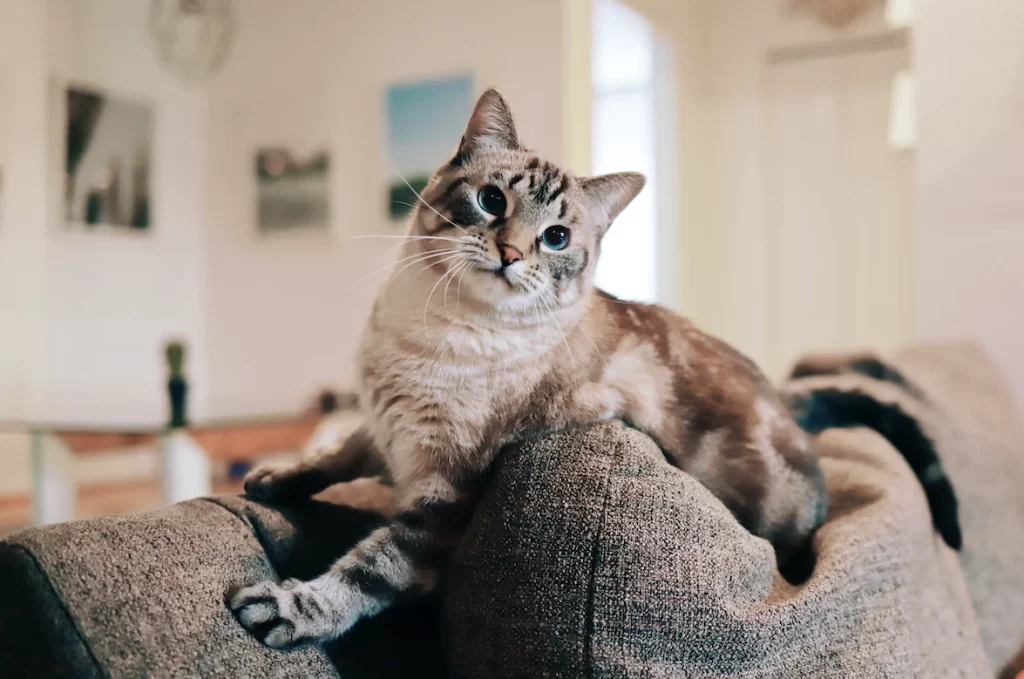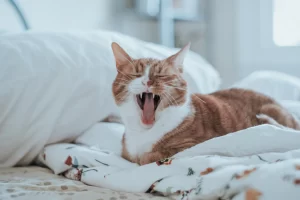Last updated on February 5th, 2023 at 01:17 am

If you’re wondering why your cat is peeing on the couch, there could be a few reasons. Maybe they don’t like their litter box, or maybe they’re feeling stressed. Whatever the reason, it’s essential to figure out why so you can stop it from happening. Keep reading to learn more about why cats pee on furniture and what you can do about it.
Why is my Cat Peeing on the Couch? The Main Reasons
There are many reasons why cats pee on furniture. However, figuring out the main reason can take time and effort. Some common reasons why cats pee on the couch include the following:
Stress
Cats thrive on routine and can get very stressed in new or unfamiliar environments. If your cat is peeing on the couch, it could signify stress or anxiety. Cats need to live in an environment where they feel comfortable and secure. There is a unique way in which cats operate. Cats do wait for you every morning at the same time you are feeding them. If you miss that time, your cat may behave unusually.
There is a negative impact on the cat’s behavior when changes in routine occur. That can result in the cat peeing on the couch as its way of expressing displeasure. There are several things you can do to change that:
-To make them feel a little less tense, create a space for the cat with its bed and toys. This will give your cat a safe place to go.
-Try and massage the cat in an attempt to make them more comfortable.
-Provide your cat with a scratching post, as this helps them to relieve stress.
-Make sure you have enough litter boxes for the number of cats in the house.
-Spend some quality time with your cat playing and petting them to help reduce stress levels.
You should also contact your veterinarian if the cat is still peeing on the couch. They can help you determine if there is a medical issue that needs to be addressed.
Issues to do with the cat litter box
This is another common reason why cats pee on the couch. If your cat does not like the litter box, it may prefer to pee elsewhere. This could be due to the box not being clean enough or not having the right kind of litter.
Make sure you regularly clean the litter box and use a litter your cat likes. You should also make sure the box is in a quiet and low-traffic area of the home.
Separation anxiety
Cats’s being more Solitary creatures can develop separation anxiety when left alone for too long. This can lead to them peeing on furniture as a way of expressing their distress or frustration. According to PetMD, if you notice that your cat is peeing on the couch when you are away, try and provide them with enrichment activities to help keep them occupied. Let friends and family members also play with the cat so that it knows it is not alone.
You don’t have enough litter box for your cat
If you have many cats in your house, you need to have enough litter boxes for them. If there is not enough, cats may decide to pee on the couch instead. You should have several boxes in the house. If you have two cats in your home, you need to have at least three litter boxes. That way, each cat will have their own place to use the bathroom.
Scent Marking
Both male and female cats mark their territory with pee. If your cat is peeing on the couch, it could be a sign that they are attempting to mark its territory.
If this is the case, you should try and discourage the behavior. You can do this by providing your cat with its own space so that they do not feel the need to mark its territory.
You can also try using a cleaning solution that is specifically designed for cat urine. This will help to neutralize the scent and discourage your cat from peeing in that spot.
Medical problems
Your cat may also be peeing on the couch as a result of an underlying medical condition. If you have noticed any other behavioral changes in your cat, such as loss of appetite or changes in behavior, it is best to take them to the vet for a check-up.
Medical issues such as urinary tract infections, kidney or liver problems, and diabetes can all lead to inappropriate urination. According to (Dolores Stantoff, Veterinary Technician, Eagle River AK), cats with UTIs tend to have discomfort and pee frequently. Therefore, it is important to get a proper diagnosis and treatment. Cats with movement problems can also have difficulty reaching their litter box and end up peeing on the couch instead.
Another medical issue is Feline lower urinary tract disease (FLUTD). This is a condition where cats experience bladder inflammation and pain while trying to urinate. Cats suffering from FLUTD may have blood in their urine, as well as difficulty and pain when trying to urinate. If you think your cat may be suffering from FLUTD, it is important to seek veterinary care as soon as possible.
Age
Age is another factor that can contribute to your cat peeing on the couch. Senior cats may have difficulties climbing into their litter boxes, or they may not be able to recognize the litter box as a place for elimination. You should try and provide them with an easier-to-access litter box, such as one that is low to the ground or has stairs. That way, your senior cat can easily access it.
Diagnosing the root cause
There are several possible causes for why your cat is peeing on the couch. Before you can properly address the problem, it is important to find out what is causing it in the first place. Let’s have a look at the different methods of diagnosing the root cause;
Veterinary Examination
This is the most direct method of diagnosing the root cause. If you think that your cat is peeing on the couch due to a medical problem, a visit to the vet is essential. They will be able to examine your cat and run tests to rule out any underlying medical issues. The tests they will run are;
- Urinalysis
This test involves a sample of your cat’s urine is analyzed to identify bacteria, proteins, and crystals. Medical practitioners will also look for signs of infection or disease.
- Blood tests
This test will help to rule out any underlying medical conditions such as kidney or liver problems. This test usually involves taking a sample of your cat’s blood and examining it under a microscope.
- Physical examination
This involves a physical examination of your cat, which will help to identify any underlying medical issues or abnormalities.
- Radiology and ultrasound
This is a vital test if you suspect your cat may have an internal medical problem. The radiologist will take x-rays and ultrasounds of your cat’s organs to check for any abnormalities.
With these tests, you will be able to identify the root cause of the problem and take steps to treat it. They help veterinarians in looking for the best type of medication to prescribe. You will begin noticing a change in your cat’s behavior after the course of treatment is completed.
How can I prevent my cat from peeing on the couch?
The process begins with finding out why your cat is urinating outside the litter box. Once you have identified the reason, then you can start implementing solutions to prevent this behavior.
- Create an ideal environment for your cats. Make sure they have enough space, toys, and scratching posts to keep them entertained.
- Provide multiple litter boxes throughout the house for your cats to use.
- Clean the litter boxes regularly and make sure you are using the right kind of litter. Cats like a clean environment that is free from too much smell.
- If your cat has medical issues, take her to a veterinary doctor for treatment.
- Ensure that your cat is getting enough attention and exercise to help reduce any stress or anxiety from being left alone for too long.
- Using a pet deterrent spray on the couch can help to keep your cat away from peeing there. There are also many other products on the market that can help to keep cats away from furniture.
- Finally, reward your cat when it uses its litter box correctly. This will help to reinforce the desired behavior and discourage them from peeing outside of the box.
Conclusion
You can try different techniques to stop your cat from peeing on the couch, and eventually, you will find the solution that works for your pet. Taking proactive steps to ensure that your cat is comfortable and not stressed is the key to preventing them from peeing on furniture. With patience and consistency, you can help keep your cat from peeing on the couch.


